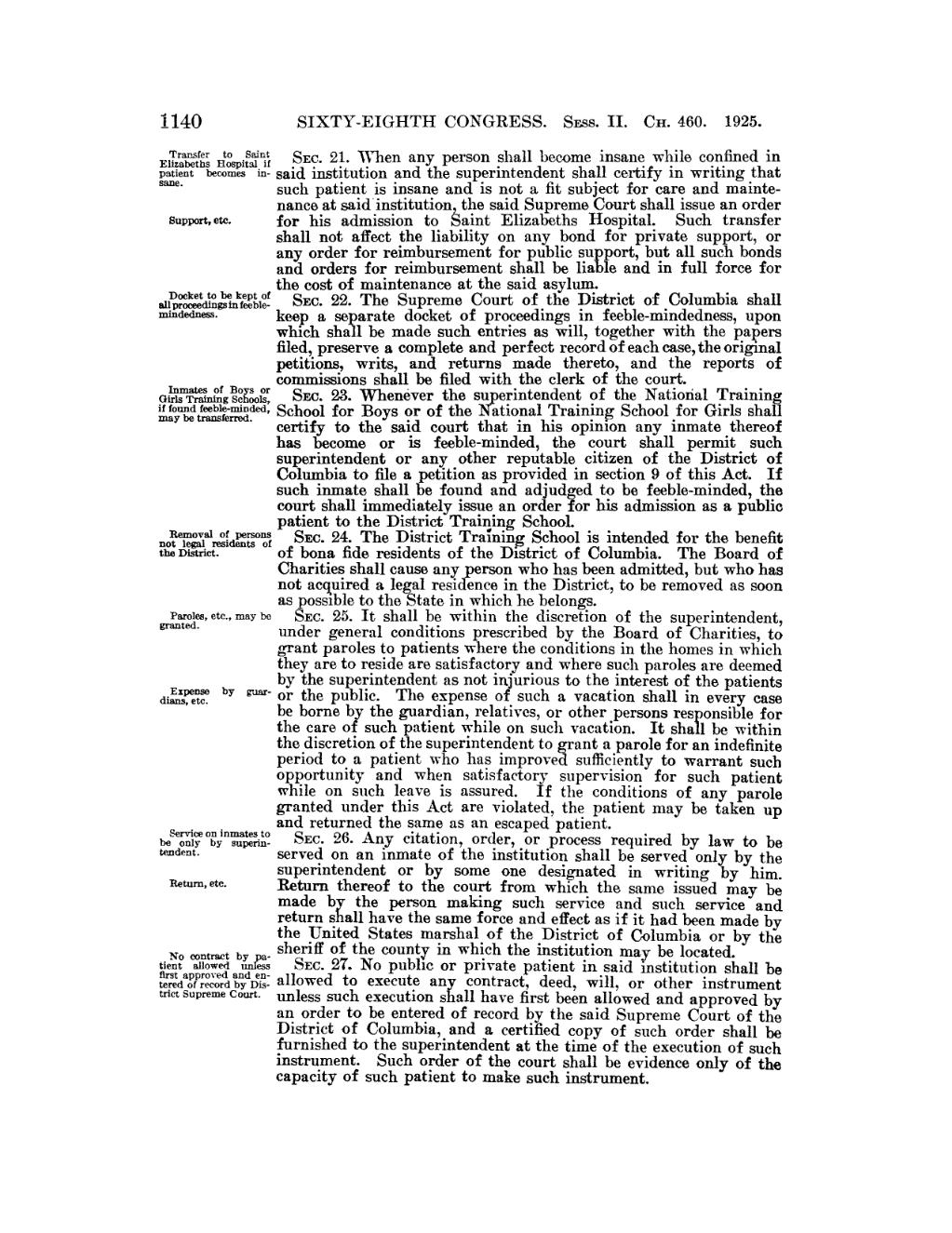1140 SIXTY-EIGHTH oouonnss. sm. II. oa. 460. 1925. '¥`§“‘" ‘° isahf Sec. 21. When any person shall become insane while confined in giiegfthiegicinigstdmi said institution and the superintendent shall certify in writing that Sam such patient is insane and is not a fit subject for care and maintenance at saidinstitution, the said Supreme Court shall issue an order 8¤¤1><>r=·¤t¤· for his admission to Saint Elizabeths Hospital. Such transfer shall not affect the liability on any bond for private support, or any order for reimbursement for public support, but all such bonds and orders for reimbursement shall be lia le and in full force for the cost of maintenance at the said asylum. sifgiiiiigaiigmhgtig Sec. 22. The Supreme Court of the District of Columbia shall ¤=i¤d¢d¤•s¤· keep a separate docket of proceedings in feeble-mindedness, upon which shall be made such entries as will, together with the papers filed, preserve a complete and perfect record of each case, the original petitions, writs, and returns made thereto, and the reports of commissions shall be Bled with the clerk of the court. G§H‘sm"·p§§Sm;‘§§ig}§§§§0§$ Sec. 23. Whenever the superintendent of the National Training §;u§;,“§gt§°§§s‘g;f_§gd“· School for Boys or of the National Training School for Girls shall ' certify to the said court that in his opinion any inmate thereof has become or is feeble-minded, the court shall permit such superintendent or any other reputable citizen of the District of Columbia to file a petition as provided in section 9 of this Act. If such inmate shall be found and adjudged to be feeble—minded, the court shall iinmediately issue an order for his admission as a public patient to the District Training School. m§°$;’;1“mg§dgPjt*g°g§ Sec. 24. The District Training School is intended for the benefit the of bona fide residents of the District of Columbia. The Board of Charities shall cause any person who has been admitted, but who has not acq_uired a legal residence in the District, to be removed as soon as possible to the State in which he belongs. Parcées,etc.,m¤ybe Sec. 25. It shall be within the discretion of the superintendent, gmm ‘ under general conditions prescribed by the Board of Charities, to grant paroles to patients where the conditions in the homes in which they are to reside are satisfactory and where such paroles are deemed by the superintendent as not injurious to the interest of the patients d,§,}gj‘;’;§f’ by gm" or the public. The expense of such a vacation shall in every case be borne b the guardian, relatives, or other persons res onsible for the care ofy such patient while on such vacation. It shall be within the discretion of the superintendent to ant a parole for an indefinite period to_ a patient who has improvegrsufficiently to warrant such opportunity and when satisfactory supervision for such patient while on such leave is assured. If the conditions of any parole granted under this Act are violated, the patient may be taken up _ and returned the same as an escaped patient. bf°(‘§§Q};°°§,§“‘§p°§§,§_? Sec. 26. Any citation, order, or process required by law to be ¢¤¤d¤¤¤· served on an inmate of the institution shall be served only by the superintendent or by some one designated in writing by him. R¤¤¤‘¤»¤*¤· Return thereof to the court from which the same issued may be made by the person making such service and such service and return s all have the same force and effect as if it had been made by the United States marshal of the District of Columbia or by the No ummm by _ sheriff of the county in which the institution may be located. 2:5;% nigga; migligsas Sec. 27. No public or private patient in said institution shall be ,,,,,,,1 §§”,_,(,0,d by DQ allowed to execute any contract, deed, will, or other instrument mm S¤¤*°m° C¤¤¤· unless such execution s all have first been allowed and approved by an order to be entered of record by the said Supreme Court of the District of Columbia, and a certified copy of such order shall be furnished to the superintendent at the time of the execution of such instrument. Such order of the court shall be evidence only of the capacity of such patient to make such instrument.
